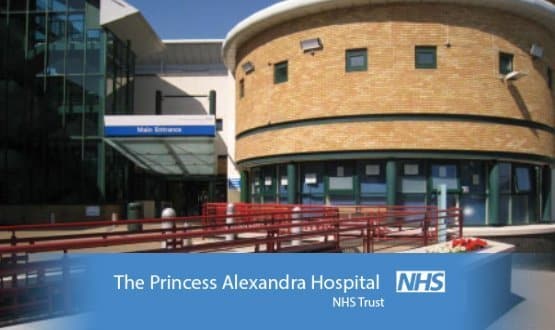CQC: Harlow trust must improve info
- 11 November 2015

The Princess Alexandra Hospital NHS Trust must improve the way information flows around its site, according to a report by the Care Quality Commission.
The recommendation is one of several made by the CQC following an investigation in July that determined the Harlow-based trust “requires improvement” in multiple areas and is “inadequate” in outpatients and diagnostic imaging.
The main problems highlighted by the CQC include a shortage of staff across several disciplines and lack of beds, meaning that patients were “allocated the next available bed, rather than being treated on a ward specifically for their condition.”
Other big issues identified include a lack of administrative staff, “poor systems that meant that patients waiting for outpatient appointments were often double or triple booked”, leading to long waits, and a lack of security for women, babies and children.
Although the CQC found that the board was struggling to handle the problems, it stressed that “staff were exceptionally caring” and often “went the extra mile for patients.”
In terms of patient records, the CQC mentions that information flows were “not always robust” at the trust.
The bulk of the information problems arose in the outpatients and diagnostic imaging services, where there were issues with medical records not always being available for the clinic. According to the CQC, this “resulted in a number of serious incidents,” including delays to some appointments.
Specifically, the trust’s incident recording system showed that in the last year there were 25 reports of notes missing, incorrect or incomplete for outpatients in the Princess Alexandra Hospital, seven for Herts and Essex Hospital and nine for St Margaret’s Hospital.
“There were also incidences of clinicians using the wrong set of notes and of a member of the public finding medical records on the floor,” said the CQC report.
The CQC adds that the trust has taken action to address these issues. This includes the appointment of a project manager in July 2015 to lead on ensuring logistics are in place for record handling.
The report mentions the ultimate aim of the trust is to scan the records and then transfer them to its electronic patient record system – Cambio’s Cosmic, which the trust went live with in July 2014.
As previously reported by Digital Health News, Princess Alexandra Hospital has had problems with the ability of Cosmic to perform national reporting for waiting times, leading to potential fines of around £1.8 million.
The CQC report mentions this issue, saying the trust was “unable to calculate accurately the waiting times for patients attending the outpatients department” and, in maternity and gynaecology, the trust did not submit data for two quarters to the national reporting system.
In a statement to Digital Health News, Cambio stressed that it has worked closely with the trust on these issues and on helping it to get the most out of its IT.
"[We] have worked since the go-live to counter the inherited clinical coding and data migration issues from the previous legacy system," it said.
"Jointly, the decision was agreed to move away from local statuses for RTT reporting in favour of national descriptions that previously had not been adopted. This was a major undertaking for [the trust] and for Cambio.
"Following several months of analysis, clinical and technical reviews, data interpreting, testing and clinical and technical training, more than 1.1 million pathway updates were converted from local to national descriptions [enabling] the trust to make the first formal RTT submission since July 2014.
"Following the success of this project, Cambio and the Princess Alexandra executive teams are looking to address a number of other local issues that were inherited and originally excluded from the EPR programme.
"One of these potential developments is deploying Cambio Cosmic's bed management. This will significantly improve patient flow."
In its response to CQC report a Princess Alexandra Hospital spokesperson said: “We are grateful for the recognition of the capacity difficulties facing the trust that have led to both staffing and bed shortages, as well as issues in outpatients.”
The spokesperson welcomed the CQC’s ‘good’ rating for how caring the trust is and mentioned several actions the trust has taken to improve its services, including a recruitment drive and intensive training.




